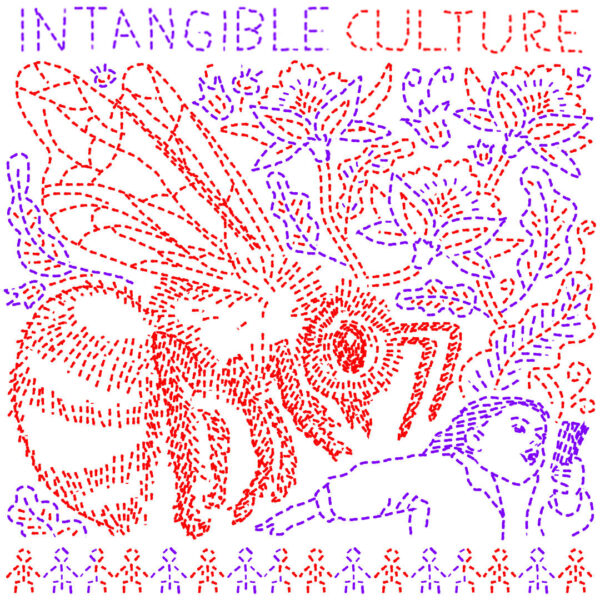Art Pluriverse: Towards a deeper understanding
 *Illustration by Christos Kotsinis and Markos Karellas, Art Pluriverse I, BoWB, CC BY-SA 4.0*
*Illustration by Christos Kotsinis and Markos Karellas, Art Pluriverse I, BoWB, CC BY-SA 4.0*
Art Pluriverse is a community science series for arts and culture that envisions a boundary spanning approach to intangible cultural heritage (ICH) through art and open knowledge. Art Pluriverse is inspired by the concept of pluriversality as expressed in the recent publication “Pluriverse: A Post-Development Dictionary” (Kothari et al., 2019), where traditional knowledge is extended to eco-cultural relations of locality, biocultural memory and grassroots collectivity. It is organised by the Biennale of Western Balkans on an annual basis.
The programme intends to situate ICH in an intercultural applied context, drawing on the anthropological theory of Manuela Carneiro da Cunha that brings a deeper understanding on the concept of reflexivity when diverse cultures coexist (da Cunha, 2009). It actively follows the development of the Declaration on Open Access for Cultural Heritage (Heidel & Wallace, 2020), which aims to inform towards equitable and consistent practices around open access, including emerging questions in areas such as decolonization, indigenisation and ICH. It is further motivated by the call on a community-centred approach for ICH’s continuity (Aikawa-Faure, 2009) and inspired by Aboriginal new media art research as published in “Transference, Tradition, Technology” (Claxton et al., 2006).
Art Pluriverse seeks to uplift cultural knowledge systems identified as traditional, local, indigenous or folk, aiming to draw attention towards diverse epistemologies of knowledge co-production. ICH describes living cultural practices that are community-based and collectively experienced, e.g. from shared aesthetic traditions to communal resource management. ICH’s multivalent manifestations often deviate from object-centred approaches and materialities, allowing the mapping of more processual, affective and symbolic ensembles. Through the community science series we envision to further explore ICH and its ecosystem of related concepts, as cultural expressions, collective memory, living heritage and ephemera, up to digital folklore, genetic resources (WIPO, 2020) and living paradigms of commoning through alternative movements and livelihoods that value traditional social systems (Varvarousis, 2019).
We acknowledge that processes of globalisation and cross-cultural hybridisation can often revive rather than endanger cultural heritage, allowing it to respond to contemporary multifaceted social and cultural environments (Alivizatou, 2016). In this context, we aim to foster convivial spaces of digital co-existence that bring together past and contemporary intangible cultural practices, while advocating for inclusive community participation of regionally active groups and small collectives, including LGBTQ, BIPOC, diasporic, cross-border and common interest or common needs communities. Art Pluriverse is conceived as a field in the making, a critical apparatus for the slow exploration of intangible culture within the interdisciplinary art and cultural discourse.
Bibliography
Aikawa-Faure, Noriko. “From the Proclamation of Masterpieces to the Convention for the Safeguarding of Intangible Cultural Heritage.” Intangible Heritage. (2009): 13-44.
Alivizatou, Marilena. Intangible Heritage and the Museum: New Perspectives on Cultural Preservation. Walnut Creek: Left Coast Press, 2016.
Claxton, Townsend, Stephen Loft, Melanie Townsend. Transference, Tradition, Technology: Native New Media Exploring Visual & Digital Culture. Banff, Alberta: Walter Phillips Gallery Editions, 2005.
Cunha, Manuela C. “Culture” and Culture: Traditional Knowledge and Intellectual Rights. Chicago: Prickly Paradigm Press, 2009.
Heidel, Evelin & Andrea Wallace. Declaration Draft. Open GLAM. 2020.
Kothari, Ashish, Ariel Salleh, Arturo Escobar, Federico Demaria, and Alberto Acosta. Pluriverse: A Post-Development Dictionary. New Delhi: Tulika Books, 2019.
Varvarousis, Angelos. “Who is Afraid of Change?.” Consider Journal Issue No1, Societe Publishing New Zealand. (2019):56-65. (Ιllustrations by Sir John Tenniel, Alice’s Adventures in Wonderland, 1865. Artwork and Graphic Design by Christina Biliouri.)
WIPO, Intellectual Property and Genetic Resources, Traditional Knowledge and Traditional Cultural Expressions. Switzerland, 2015/2020.